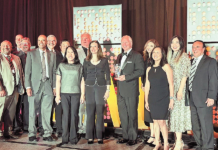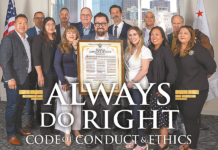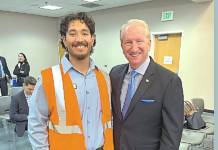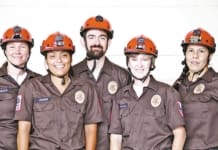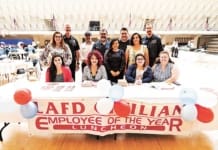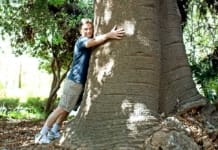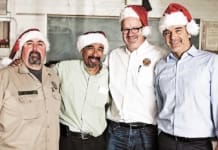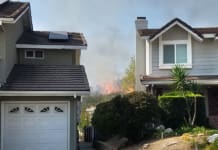Photos by Summy Lam, Club COO; and Alive! editor John Burnes
It’s smooth sailing with the LA Port Police Marine Unit during Fleet Week.
A
mong the many amazing ships on display during Fleet Week, held annually in the Port of Los Angeles, some might evade attention. Those are the smaller, sturdy, gray yet very active patrol ships that belong to the Port of LA Port Police.
Port Police Officers don’t appear only during Fleet Week. They are on patrol and hard at work every hour of every day, making sure commercial and recreational boaters alike have safe and productive experiences.
The Alive! crew spent a morning during the most recent Fleet Week patrolling the LA Harbor with the Marine (boat patrol) Unit, witnessing their usual chores and procedures during a special event on the land and water. We thank them for their courtesy, notably Lt. Philip Heem, Club Member, head of the overall Maritime Division.
About the Port Police Marine Unit
The Port Police Maritime Operations is comprised of both the Marine Unit as well as the Dive Unit. Here is some information about them:
- Marine Unit Officers patrol the water similar to cars patrolling the street.
- Everyone assigned to Maritime Operations has a U.S. Coast Guard Captain’s license.
- They specialize in regular patrol, search and rescue, vessel accidents, and homeland security.
- The unit serves with a minimum standing of two patrol boats, 24 hours a day.
- The unit escorts every single cruise ship into and out of the Port and have since 9/11.
- Many of the Marine Unit Officers also teach at the Port’s Maritime Law Enforcement Training Center.
- The Marine Unit is the biggest unit in Port Police, with 26 Officers.
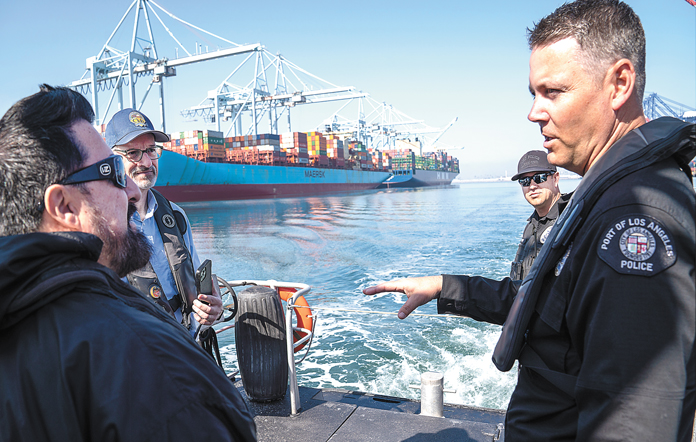
About Fleet Week
Cosponsored by the City of Los Angeles, the Port of Los Angeles and the Port Police, among other organizations, is a free, multi-day event celebrating the U.S. Sea Services, featuring ship tours, military displays, food, entertainment, and more. It draws landside crowds in the hundreds of thousands every year.
The event runs generally on the Memorial Day weekend and in 2025 ran from Thursday, May 23, through Monday, May 26. •
Club CEO Robert Larios (center) as the Port Police Marine Unit aboard Boat 42 prepares to sail, clockwise from lower left: Field Training Officer Aaron Smith, 18 years of City service; Sgt. Logan Braun, Marine Unit Supervisor, 18 years; Patrol Officer Alan Ortega, 1 year; Patrol Officer Eric Flores, 1 year;Lt. Phil Heem, Marine Operations, 17 years; and Maritime Officer Andy Wang, 18 years. All are Club Members.
The Police on the Waterways
On May 1, Club CEO Robert Larios and Alive! editor John Burnes interviewed four personnel on the Harbor Port Police Marine unit, including: Lt. Philip Heem, manager of Maritime Operations, 17 years of City service; Sgt. Logan Braun, 18 years; Officer Aaron Smith, Marine Unit Field Training Officer, 17 years; and Officer Andy Wang, 17 years. • All are Club Members. •. The interview took place via Zoom.
Thanks, Officers, for talking to us about the Marine Unit, before we head out with you during Fleet Week. Looking forward to that!
Tell us, how did you get to your current position?
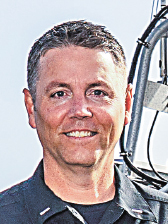
Lt. Philip Heem: I came from the US Coast Guard. I served nine years there, which is a big reason why I came to the Port Police. When I got out of the Coast Guard, I knew I wanted to serve my community as a Law Enforcement Officer, but I also wanted an agency that had a maritime program. The Port Police was the perfect fit for me. I get to be a Law Enforcement Officer and build on the nine years of training and experience the Coast Guard provided.
Everybody starts out in Patrol. You do your time in Patrol, and then eventually most will work their way into a specialized unit if that’s what they want to do. My goal was always to come to the maritime side of things. When I say Patrol, I’m talking about landside of law enforcement. Eventually they opened up the Marine Unit, so I came over for that. I accepted a fulltime position doing in-service training for the Marine Unit. From there, for a brief second, I went to a Maritime Community Relations Officer position and then went to our dive team for a number of years, where I was promoted to Officer III and then to Sergeant shortly after that. I came back to Patrol for a few years, and then I was promoted to Lieutenant. I stayed in Patrol as a Watch Commander for a couple of years. About a year and a half ago, I was directed to come back to the Maritime side as the Maritime Operations Division (MOD) Lieutenant.
Where were you stationed with the Coast Guard?
Lt. Heem: It’s funny. I grew up in northern Minnesota, but right out of boot camp I was sent to Newport Beach where I served on an 82-foot cutter and then on the 87-foot cutter that’s there now, the Narwhal. That was some really, really tough duty there [laughing].
From there I went to our “A,” school, where you learn your trade. I was part of the last graduating class of Quartermasters (QM). The Coast Guard did away with that rate, and QMs became either Boatswains Mates or Operational Specialists. I became a Boatswains Mate. Quartermasters in the Coast Guard do the navigation of the ships. So I learned maritime navigation and received orders to a 110-foot patrol boat in Honolulu for another really tough gig.
From there I went to the small boat station here in the Port of LA.
You’ve been on the water for a long time.
Lt. Heem: Yes.
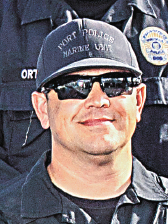
Sgt. Logan Braun: During college, I worked on boats in San Diego as my summertime gig. I grew up kind of outdoorsy thinking about fish and wildlife, or something in the biology field. Working in San Diego, I was able to get sea time and then I earned my US Coast Guard captain’s license. With that, I started seeing all the patrol boats around from the maritime law enforcement units from the San Diego Harbor Patrol, Oceanside Harbor Patrol up to LA. That’s how I got pushed toward law enforcement.
I started with the Orange County Sheriff’s Dept. for a couple years, and then I came up here in 2007. Within two years of Patrol with Orange County Sheriff, I came over to the Maritime Unit at Port Police and was promoted to Sergeant. The Maritime Unit is a good fit. The agency is a good fit. I’ve been on the water for long time, too.
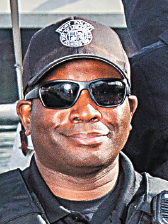
Officer III Aaron Smith: I served about 19 years in the military, in the U.S. Navy and the U.S. Army. After that, I wanted to transfer to something in the civilian world that gave me the same sense of camaraderie and service that I felt when I was in the military; law enforcement felt like it was a good fit. I worked Patrol for a number of years and the Bike Team for a number of years. When the opportunity came to join the Marine Unit, I jumped on it. I wanted to do something that was a little different and stood out in law enforcement role. I worked in the Marine Unit for a little bit, and then I was promoted to Field Training Officer back in Patrol. Then an opportunity came to be a Field Training Officer in the Marine Unit. I jumped right on it, and I was fortunate enough to be able to come back to this position.
I am currently with the National Guard, too.
Thanks for your service.
Lt. Heem: And a commissioned Officer, too.
Officer Smith: Yes, I received my commission in the National Guard.
Excellent, very impressive. Officer Wang?
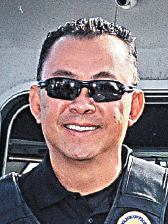
Officer Andy Wang: Back in 2007, I was working in the private sector. At the time I was also in the Military Reserves, a very similar story with Officer Smith. I wanted to find a place where I could continue my service. I was going through the City hiring process, and that was the time when I discovered LA Port Police. I came on a ride-along, enjoyed the environment and the opportunity, and I certainly enjoyed the people who were there. That’s when and why I started my police career.
I started in Patrol. After that I did some time in the planning section.
I always had a fascination with boats. And being on the water on one of the fast boats feels so exciting to me. When the opportunity opened up, I applied for the unit, and I continued my service with the Marine Unit through today.
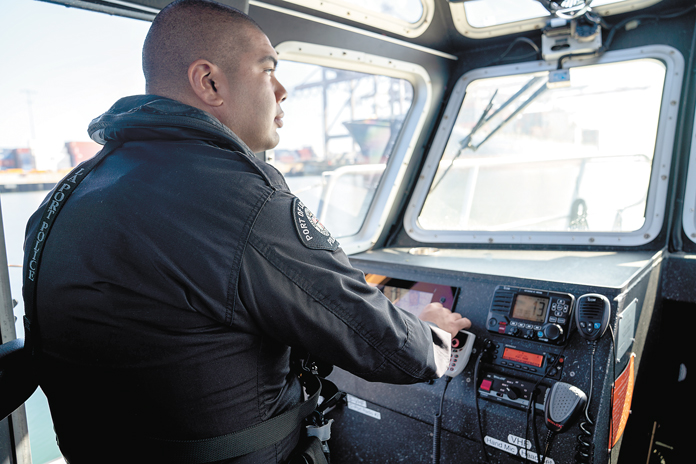
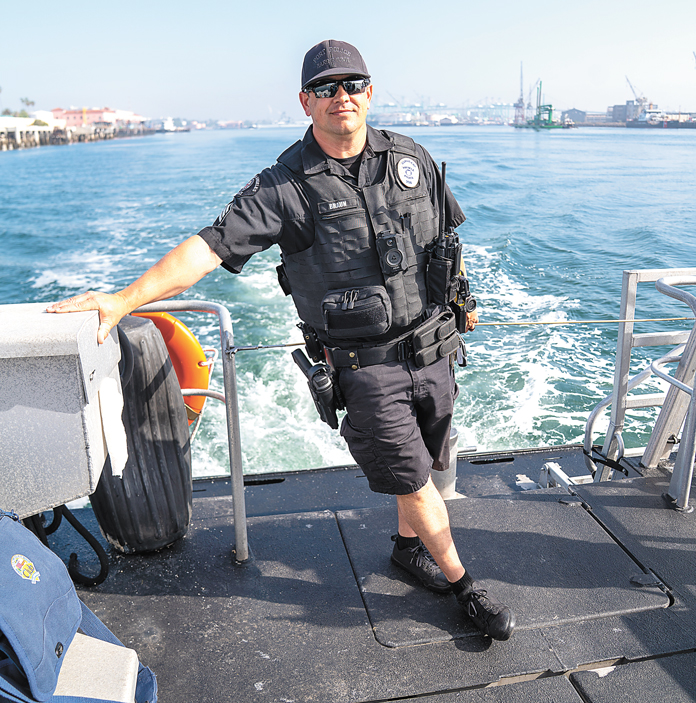
Water Calling
A lot of people who want to dedicate their life to law enforcement, choose to be on land. What drew you to water-based law enforcement?
Officer Wang: The Port Police family really drew me in. It was the close-knitted community. People have so much fun working here, and that was something that I gravitated toward. That’s why I chose this department.
Lt. Heem: I fell in love with the maritime world while serving in the Coast Guard. The ocean is fascinating to me, and it seemed foolish to walk away from all the training and experience I gained from the Coast Guard. It was really important to me to find a law enforcement agency with a strong maritime program.
Sgt. Braun: I was drawn by the relative size of the agency and the uniqueness of it. We’re so diverse in what we do. We have bomb dogs, we have Sea Marshal detail, we board cruise ships, we have a full-time hazmat team, we have HIDTA [high-intensity drug trafficking area] teams, we have detectives, and we all work together. That’s the nice thing about the smaller agency – we’re constantly seeing each other. We know who’s who, versus a large agency, where I feel like sometimes you can get lost in it.
Also, the Port is considered the equivalency of a border. We’re dealing with international considerations. Knowing what doesn’t belong here drew me here.
Officer Smith: In addition to what everyone has already said, we wear so many hats. In addition to protecting the citizens on land, we’re protecting the citizens on the waterways. We’re protecting our recreational boaters and the international commerce that comes through the country. We are protecting our borders. We work with so many different agencies, it’s hard to pinpoint one thing that we do. We have many different missions and many different aspects of what we do. We’re never doing the same thing twice.
Tourism is another big part of it.
Officer Smith: Absolutely.
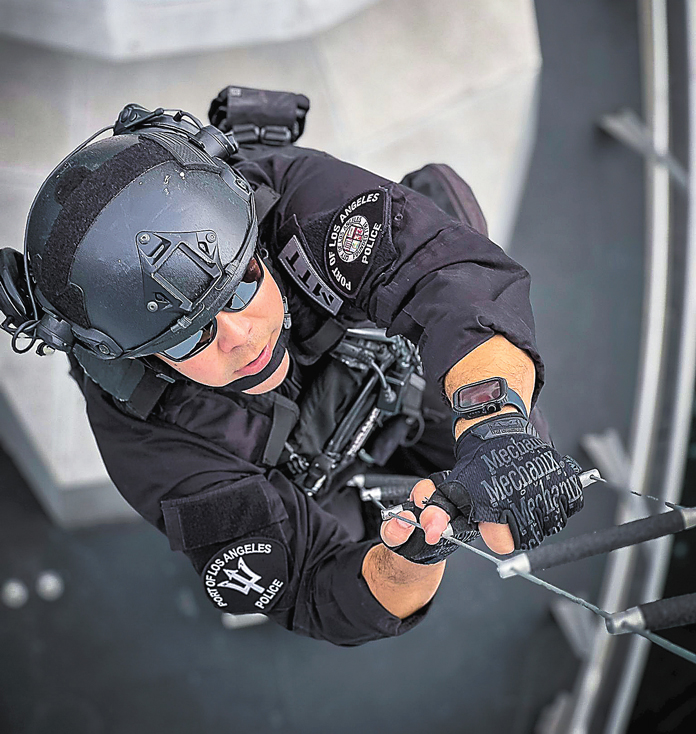
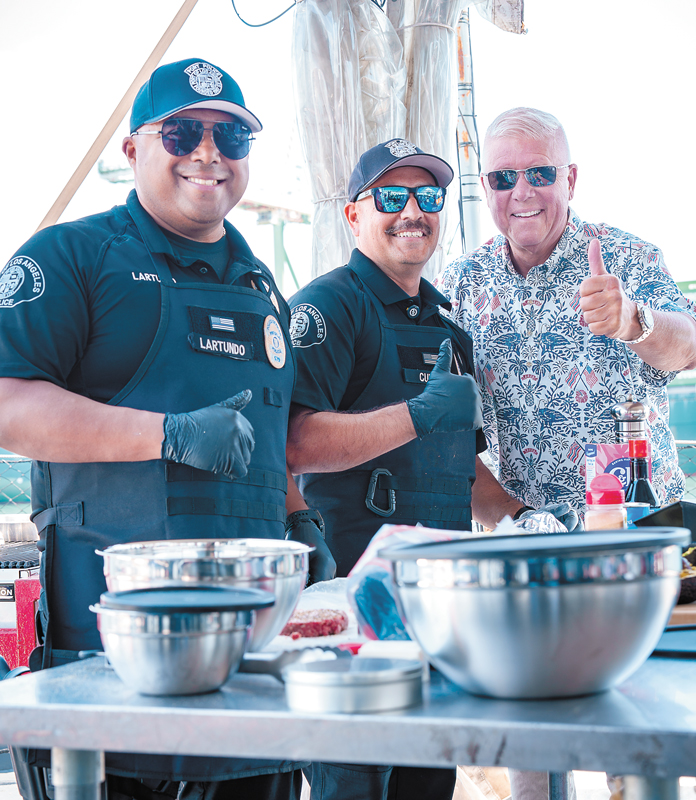
The Marine Unit
Describe the Marine Unit – its main purpose and daily functions. What is it? And what is it not?
Officer Smith: Our main job is to protect the waterways. We protect commerce. Commercial ships come in and out, and it’s our job to make sure that they are able to come in and out freely. In addition to that, we have a beach and we have launch ramps; we have marinas that recreational boaters like to use. It’s our job to make sure that they are operating safely, keeping in mind anti-terrorism. We protect the cruise ships that come in and out. We’re the police on the waterways.
Sgt. Braun: We deal with the recreational side and commercial side. They overlap, and our job is to be that median to keep the public safe and commerce flowing. With how much commerce we move into the United States, if we have to shut down the Port for any period of time, that’s not a good thing. Our job is to educate the boating public, keep them out of the area and keep commerce moving around. The biggest thing is to ensure the waterways are safe.
Officer Wang: The Port of LA is a unique environment where properties are accessible by land and by water, and that’s why we have a Marine Unit. Some places aren’t accessible by land, and that’s when our Marine Unit come into action.
Lt. Heem: We all go through the LAPD’s Police Academy, and we build that foundation. Once we get on the water, you take a lot of that expertise with you … but on the water now you have to relearn a new trade. We have a Maritime Law Enforcement Training Center here in the Port that has been adopted by the California Department of Boating and Waterways, and is also Peace Officer Standardized Training (POST) approved.
I didn’t realize that.
Lt. Heem: Yes. I think it’s the only one on the West Coast. The program is necessary if you’re going to work on boats. You take everything you learned on the land side and bring that with you to the water side. Instead of driving cars, you’re driving boats. Instead of enforcing vehicle code, you’re enforcing harbor and maritime codes that go with that. That makes it unique.
Do you accompany all the ships that come in past the breakwater into the Port?
Lt. Heem: No, however, we do escort every cruise ship in and out of the port. We may receive requests from the Coast Guard for escorts of High Value Assets or High Interest Vessels, or the Pilots may request assistance with heavy vessel traffic
How big a deal is search and rescue in what you’re prepared for? How big a part of your day-to-day life is search and rescue?
Officer Smith: One of the things that makes us unique is that law enforcement is probably half of what we do. The rest is ensuring safety, making sure we don’t have to do search and rescue efforts by doing safety inspections and making sure that people are being safe in the water. But in addition to that, we’re constantly in contact with the Coast Guard, and we listen to our Marine radios. Whenever someone calls out and says they need help, we are there to quickly respond within a moment’s notice. In many cases, we can get there faster than the Coast Guard because our assets are there and available 24 hours a day.
How far out is your jurisdiction?
Lt. Heem: Just like any other municipal Police Officer in the state of California, we’re peace officers for the state of California. State waters go out to three nautical miles. That includes Catalina Island. That’s the letter of the law. We generally patrol the waters of the Port of Los Angeles, but work closely with our neighboring agencies. There are no hard lines per se. It is not uncommon for us to find ourselves well outside the breakwall or up and down the coast assisting with, or responding to, an incident. But our primary responsibility is the Port of Los Angeles.
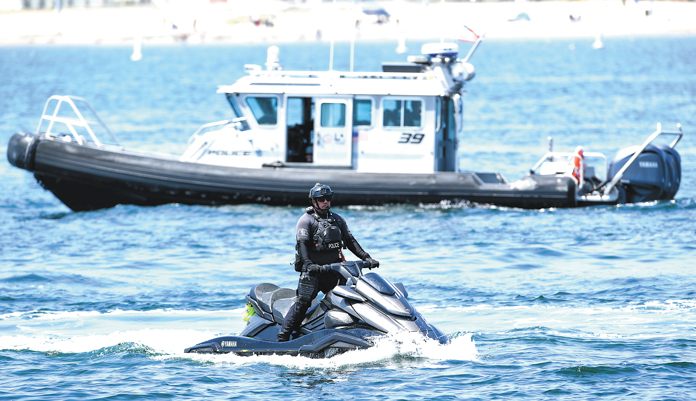
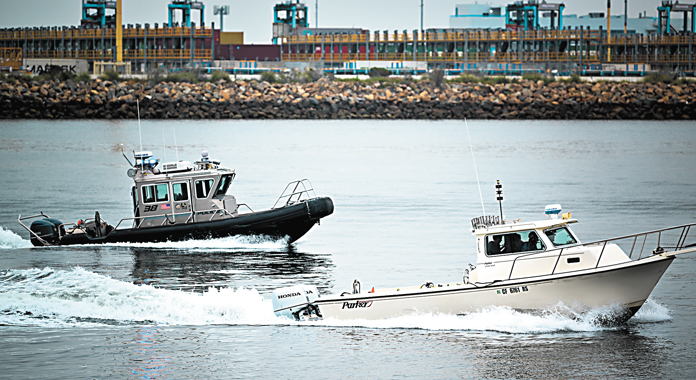
History
When the City annexed the harbor a long time ago, there had to be a police force set up. How long has Port Police been in business? Has it grown with the Port?
Lt. Heem: Yes, the Port Police has grown with the Port.
1911 is really the inception of the Port Police. In 2011 we hit our 100-year mark. As an agency we’ve been around for quite a long time. We have gone by a few different names, including Wardens, but the agency and its mission have been around for more than 100 years now.
How has it grown? As the Port has grown, how have Port Police’s responsibilities changed and grown?
Sgt. Braun: I can tell you this, after 9/11, the Dept. went from around 30 to 40 Officers. We grew to 70 Officers in three years. The four of us here are part of that growth. We all joined around the same time. A good majority of department all came on at the same time.
Our responsibilities have grown. The cruise ship duties have grown with passenger growth. We’ve evolved with the cruise ship presence here.
When did the Marine Unit become a specialty unit? Is the Marine unit the biggest unit at Port Police?
Lt. Heem: We have the Officers assigned to it. We’ve always had boats on the water; that’s always been part of the Port Police, but it became a full-time standalone unit I want to say in 2012.
It started small with just a handful of guys who served it full time. Our org chart today shows 26 Officers, two Sergeants and a Lieutenant. That’s just for the Marine Unit. It doesn’t include the dive team.
The Maritime Division is different.
Lt. Heem: Right. The Maritime Operations Division includes the Marine Unit and Dive Unit.
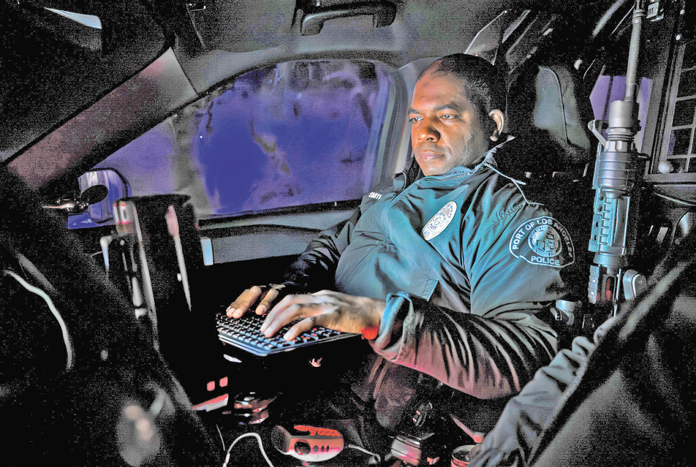
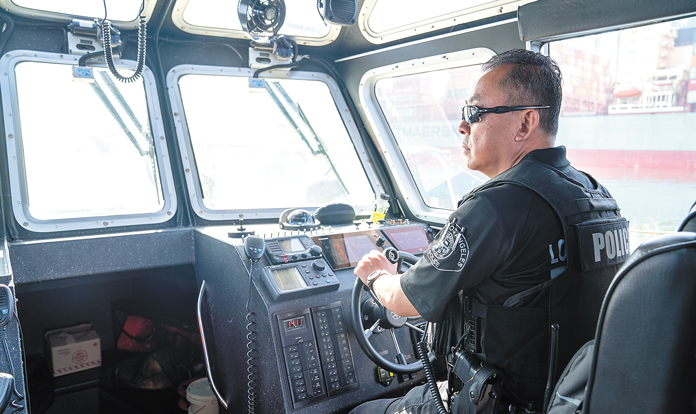
Challenges
What challenges do you deal with on a daily basis, and what makes Marine duty uniquely tough?
Officer Wang: We’re all Police Officers, and we have skills necessary to do that. But once you start conducting that on the water, it presents a lot of additional challenges. You’re dealing with the water, with operating a vessel, and with a lot of challenges. It’s a unique environment.
When you stop somebody in a car, you park the car, and the person in front of you parks the car. But on the water, everything’s moving at the same time. There’s a unique challenge in that. You have to correct the attitude of the vessel to make sure that you’re in a safe position.
And I would think that you can’t always assume the level of skill of the person who you’re dealing with on the water. They might be novices, they might not have any experience, or they might be super experienced. I would imagine you have to assess that pretty quickly.
Officer Smith: That does become a challenge. The police boat operator has a tremendous amount of responsibility to determine if the person’s boat is safe. They have to be on the lookout for other traffic in the area to make sure that other people are safe. While the other Officer is conducting the police business, the boat operator has to cover that Officer in case something does go awry. You’re wearing a lot of hats, and you have to constantly be in the game.
Lt. Heem: Traffic stops are arguably the most dangerous events in law enforcement. We don’t know the people we stop, we don’t know if they’re armed, or if they have bad intentions. Controlling the movement of those in the vehicle is important. On the water, we’re very isolated, and there is little-to-no backup. Doing safety inspections causes persons on board to move a lot, sometimes out of site below decks to retrieve mandatory items. It’s common for vessels to carry knives, firearms, flare guns and other tools that can be used as weapons. It’s a very unique environment and requires a high level of expertise from our Marine Unit Officers.
Officer Smith: You’re isolated because you’re on the water.
Sgt. Braun: That and the weather. We patrol even in fog, no matter what. We’re out there using radar, and you might not be able to see three or four feet in front of you. All you hear is a giant horn, you’re asking, what am I dealing with? You and your partner are going through all the checklists to navigate the Port safely, and ensure that the boating public and the commercial traffic are safe. The added issue fog can be pretty dangerous out there.
The sheer size of cruise or container vessels – those things are huge – has to be a challenge, too. Do you ever board them?
Lt. Heem: Generally we won’t board them out at sea unless there’s some intel that would drive that. It happens, but it’s not frequent. If that were the case, a lot of planning would go into that. We’re not going to board a big ship with just two Officers. But we do board those ships when they dock up. We have different inspection forms and inspect oil tankers or cargo ships. It’s one of the unique things that we also get to do here.
Are you inspecting the containers within those huge ships?
Officer Smith: Our main concerns are safety and environment. As for inspecting the actual cargo itself, that’s more of a Coast Guard and Customs realm. We want to make sure the ships aren’t leaking or pouring anything into the water. We do get calls when some types of criminal activity happen on a ship. Say there’s an assault, a battery, or something to that effect, we will go and investigate and help by whatever means we can.
Are you responsible for making sure that the ships are plugged into ground power, instead of running their engines when docked?
Lt. Heem: Not so much for them plugging in. The Harbor Dept. has divisions that take care of a lot of what you’re talking about.
— Feature Interview continues after Fleet Week story below.
Captain’s Licenses
Okay. You all have captain’s licenses from the Coast Guard. Is that a State of California requirement, or where does that come from?
Lt. Heem: That’s more of an internal process that we have mandated for anyone who’s working in Maritime operations. Everyone in the Marine Unit, everyone on the dive team, and everyone who is an instructor at our Maritime Law Enforcement Training Center, is required to have the license by our own internal standards. It’s not mandated by the state or the Port. The Port of LA is a huge commercial port. and we are dealing with a lot of professional mariners. It’s one more feather in our cap, so to speak, for the Marine Unit to have that formal training and be able to speak the same language, to have some of the same expertise. It’s one more thing that makes us more professional when we’re dealing with the public, either recreationally or commercially.
Sgt. Braun: It puts us on the same page with them. I talk their lingo or have an understanding when we’re investigating or questioning things. That higher standard with the captain’s license goes a long way. They understand that we’re not just law enforcement, we understand what’s happening on the water. We actually get better information from these captains because of it.
Officer Smith: The Police Academy teaches you about the penal codes, municipal codes and vehicle codes. We don’t learn much about harbor navigation codes or any type of maritime laws. So getting the captain’s license is a good way for us to learn and enforce those laws.
Lt. Heem: We don’t have the streets and the lanes and the traffic lights and the signs to guide us. It’s all governed by navigation rules of the road. That’s basically what the captain’s license harps on the most – who has the right of way in different scenarios, and we do enforce those as well.
Officer Smith: It’s our version of the vehicle code.
Lt. Heem: Yes.
To be fair to the captains who pilot their ships into the Port, there are different levels of captain’s licenses. The highest level we have for some of our guys is a 100-ton license. But it goes up from there. The people operating the ships have an unlimited tonnage with a lot more schooling that goes with that. But we at least have the base level foundation training.
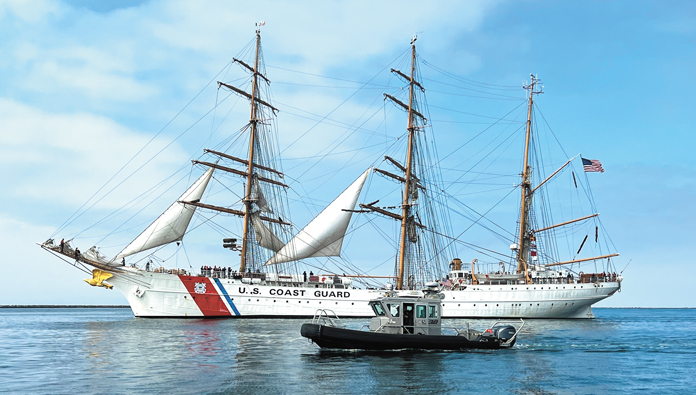
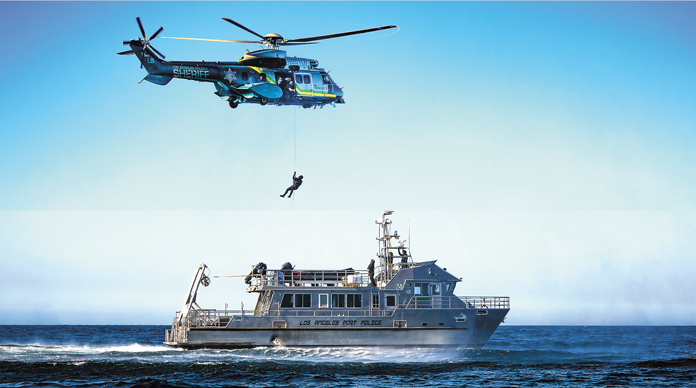
Standing Apart But the Same
Is the Port Police the largest in the country in terms of Officers dedicated to patrolling a port?
Lt. Heem: I don’t know about size, but we’re definitely one of the premier maritime law enforcement agencies in the country. I’m sure there are other states like New York or Florida, maybe Texas, that have large maritime units, but as far as training, expertise, and skill-set, our Officers set the mark and could compete with anyone.
Officer Smith: One thing that makes us unique is that we are a separate agency. I know that New York and a lot of other cities have large police departments, and they have Marine units within their police departments. We are a completely separate agency, where we have a completely different chief and we have our own policies. We’re unique in that way.
What’s something you wish people understood about what you do?
Lt. Heem: We’re regular human beings with families and kids, and we all want to get along with everybody the same as anybody else. We have a unique job, and part of that is enforcing the law. But that doesn’t make our desires any different than anybody else we encounter.
Officer Smith: I never woke up and said, man, I can’t wait to take somebody to jail today. That’s never been my goal. It’s been the end result when I’ve come into situations, but that’s never been my goal. My goal is to make sure that people are being safe, my partners are safe, and make sure everyone goes home okay.
Officer Wang: When we arrive and talk to people, we’re always there to help. That’s something we want people to understand – the end goal is to make sure people are safe. People are conducting their lives. Our job is not there to ruin people’s day. Once motivation for making contact with people is to help them.
Sgt. Braun: Ongoing conflict resolution. I wish people would understand the importance of conversation. Because of my maritime background, I know a lot of the business industry people down here. I make a habit of going down to talk to the people because I want them to see me as another member of the community, whether it’s the boating community or just society. The importance of communication with law enforcement, that’s what I want them to see. It’s okay to mutually disagree about something where it’s just a casual conversation. I want to understand where they’re coming from, and then on the other side, I want them to understand where I’m coming from so I can bridge that gap.
Tell us a success story or two that just made you feel like you were doing the right thing with your life.
Officer Smith: I was out on patrol once, and there was a gentleman on his sailboat with his dog with him. We have a lot of marine life that travels throughout the Port here. The dog saw some seals in the water and got interested and decided to jump out into the water to get to the seals. Unfortunately, the sailboat was too tall, too high. It sat a little too high off the water for the operator to reach down to get his dog. His dog was drowning. Luckily we were in the area, and we were able to get there to rescue his dog and bring him on board and get him back safely. We didn’t save the world that day, but we really made a difference to him. He was extremely thankful that we were there and able to help him because his dog meant the world to him.
Officer Wang: I came across a couple kayakers in our Cabrillo anchorage area. They didn’t know the area well enough to know that the wind kicks up in the middle of the afternoon. They had a lot of trouble getting back to the land on time. We happened to be at the right place at the right time. We were doing our patrol and were able to help them get safely back to the land on time, where they could go about their business. I was really happy that I was able to help them.
Sgt. Braun: I’m still thinking about it.
Officer Smith: He’s just happy to work with wonderful Officers like us every day!
Lt. Heem: What probably makes me feel the best going home at the end of the day is anytime we get involved in search and rescue, because that’s literally when you’re helping people in their worst time of peril. Whether it’s a sinking boat or a vessel fire or people being lost at sea, being able to bring people back to their families and reconnect them are always pretty big events where everybody goes home feeling good about themselves.
Sgt. Braun: I have to agree with the Lieutenant here – the search and rescue, or being the first on scene and rescuing someone in a dire moment is a highlight. We had one earlier this year during the Palisades fires. We got a call for three boaters who were capsized up on the rocks. I maneuvered the patrol boat in and got them up onto the boat safely, and then took them to the fire department to treat them for hypothermia. Being able to help them out was very rewarding, especially for the career I picked. To be there in their time of need is the most rewarding thing for me.
Speaking of the Palisades fires, I know Port Police had responsibilities in the Palisades. Were any of you involved?
Lt. Heem: Yes, everybody was. We call it an AB Watch when everybody’s on duty. We canceled days off. Everybody, whether you worked the Marine Unit or the canines or motors, it didn’t really matter. We sent everybody we could up to help out.
Do people know the Port Police?
Officer Smith: Everyone knows the LAPD, and they sometimes see the Airport Police because people are always traveling. I think in that sense, we are almost forgotten. I want people to remember that we are here and we are a resource for the City of Los Angeles and our neighbors. We’re here not only to protect, but to be a service to our community. You might not see us all as much, but we are here.
Lt. Heem: I’m one of the instructors at the Maritime Law Enforcement Training Center, and we get people who come in for training not just from all over the state, but from the country and sometimes internationally. I get a peek behind the curtain of what other agencies are doing on the maritime side. It always reminds me how professional and advanced our Marine Unit is compared to what everybody else is doing. A lot of agencies out there send their people out without a lot of training or experience. Not us. I always learn coming out of those classes just how far advanced our Marine Unit is. Our training definitely sets us apart from any other maritime agency that I’ve seen as far as local law enforcement goes. I think it’s awesome that Port Police has invested that much time and effort into getting us where we are today. We’re thankful for that.
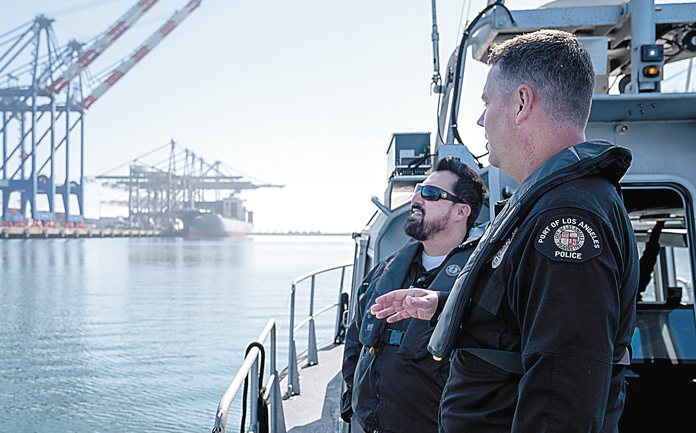
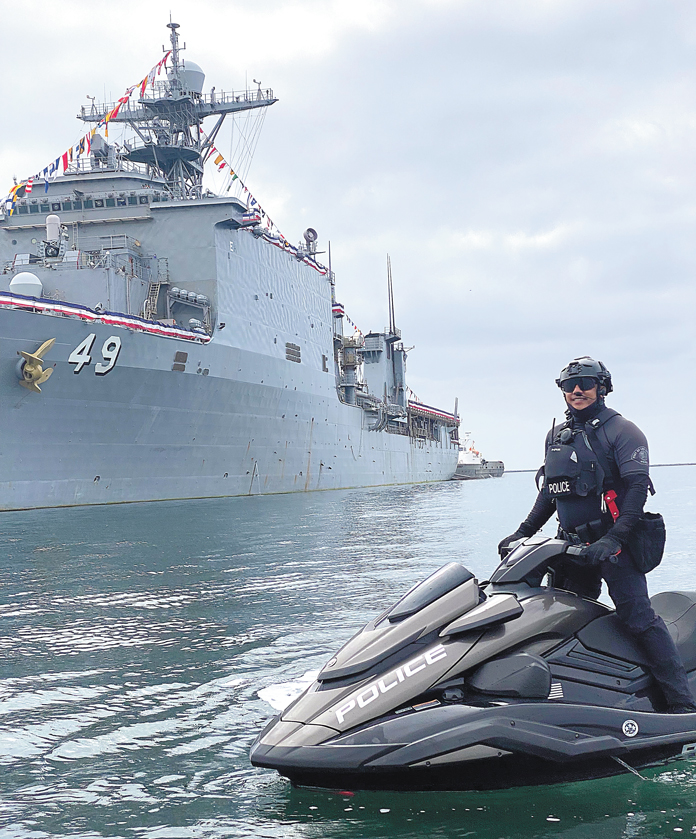
Lifelines
What do you love about what you do?
Lt. Heem: Being a Lieutenant, I’m mostly in this office, so that’s not very exciting. But every now and then I get to go out and watch these guys operate boats for a living. Every time I see it, it’s like, goodness sakes, we’re the luckiest people on the planet. Some of these guys operate Jet Skis – Officer Smith just got certified for our Jet Skis. We have eight Jet Skis that these guys get to pull out at any time, which is another unique aspect of the Marine unit. It could be a beautiful summer day out with no wind and the ocean’s flat and calm. These guys are out there on a Jet Ski. It makes me jealous.
Officer Smith: It’s very hard work. Somebody has to do it.
Lt. Heem: Being able to work on the water is awesome.
Officer Smith: My favorite aspect of the job is when I have someone tell me that they were always afraid to go out on the water or afraid to be out on boats, but when they saw us out patrolling, they felt more confident being in the water, and more confident because they see us out there. We have a lot of marinas where a lot of people see their boats only once or twice a month on the weekends. Their boats are vulnerable. I’ve had people on marinas tell us, they were so glad to see that we patrol around here. “I’m so glad to see you guys walking our docks and making sure that our boats are safe.” When people say they feel better about their lives because of what we’re doing, then it makes me feel like we’re in the right job.
Lt. Heem: I’ve walked the docks with the Marine Unit guys, and every now and then they’ll come across a boat that’s listing right. It’s not sitting right in the water, which generally means it’s taking on water or sinking right at the dock. Watching these guys take proactive measures, meeting with the marina managers and identifying whose boat it is and being able to call the owner and tell them your boat appears to be sinking at the dock. We’ll be able to help get dewatering pumps on board and make sure the boat’s safe until the owners get there to take over. It’s pretty cool that we get to do that for the people who have no idea that we’re out there looking after their property and making sure that what they have is safe.
Officer Wang: Operating a boat is just such a cool thing to do. Every time I get on the water, when I pass by the other boaters around the marina, they always look at me and say, “Oh, my God, you have the best job.” I agree with them. I had a pretty good assignment here prior to being on the Marine Unit, but I was happy to give all that up so I could be on the water and operate that boat.
Sgt. Braun: I love the human interaction. I love being able to talk to the public. I’m in a different role and capacity than these guys. Yes, I’m an Officer, but I have a different responsibility. Helping after a call by talking to people and their kids, handing out stickers and interacting with the public. We have a lot of kids coming down here to fish. These teenage groups could be doing a lot worse things. I talk shop with them and it builds that rapport. It’s a great interaction. That’s what I love about this job and this unit.
Lt. Heem: We all have different roles and responsibilities with different ranks. One thing we’re working on is meeting with all the marina managers. When we do that, a lot of the marina residents show up as well. We ask them, what do you want to see us doing more? Is there anything we could be doing better to serve the local community? And then putting plans and strategies in place to fulfill what they expect of us, and following up and making sure those needs have been met – they go a long way with the public as well.
It is a unique community. Generally, people who are on the water, are in good moods, right? They get to go take their big investment and go play around with it. Being out there and working with them is a good thing. We’re thankful for that.
Are any of you recreational boaters? Do you get on boats when you go home, or do you leave it at work?
Sgt. Braun: Hey, the best boat is your friend’s boat! I can wash your boat, put gas in your boat and clean your boat. I’ll drive your boat, but at the end of the day, it’s your boat.
Lt. Heem: There are a lot of maintenance needs. I don’t have any. I don’t do recreational boating. Not that I wouldn’t, but it’s a very expensive hobby. I want to patrol. I want to do stuff. I want to search and rescue or look for violations, so doing that recreationally isn’t the same.
Officer Smith: We work 12-hour shifts, and we work three to four days a week, sometimes overtime. That’s a lot of time on water. So I’m good.
[Laughter]
Well, with that, from all of us here at the Employees Club of California, we thank you for time today, and for your service to Los Angeles.
Lt. Heem: Awesome. Thanks for talking to us. We appreciate your highlighting the Unit.
Sgt. Braun: Thank you.
Officer Smith: Thank you so much.
Officer Wang: Thank you! •
| BEHIND THE SCENES
|


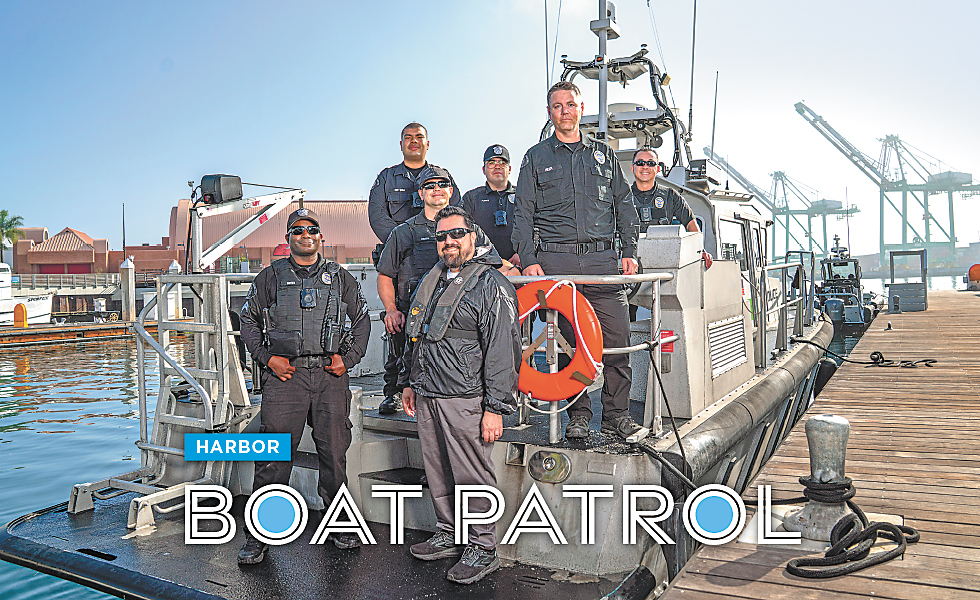
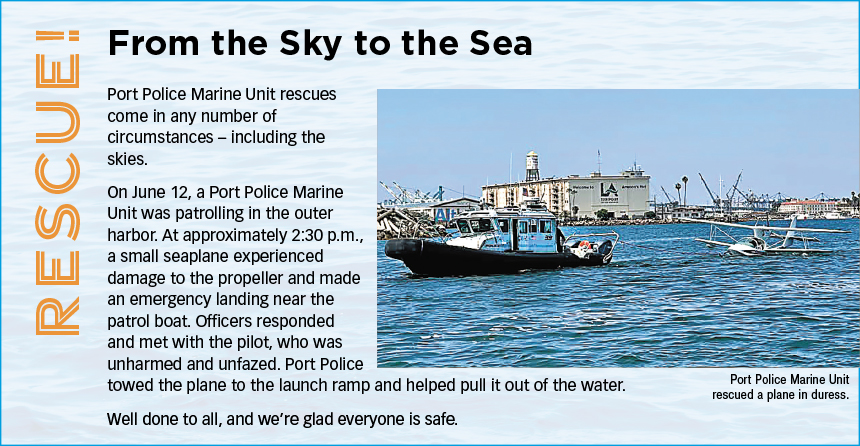
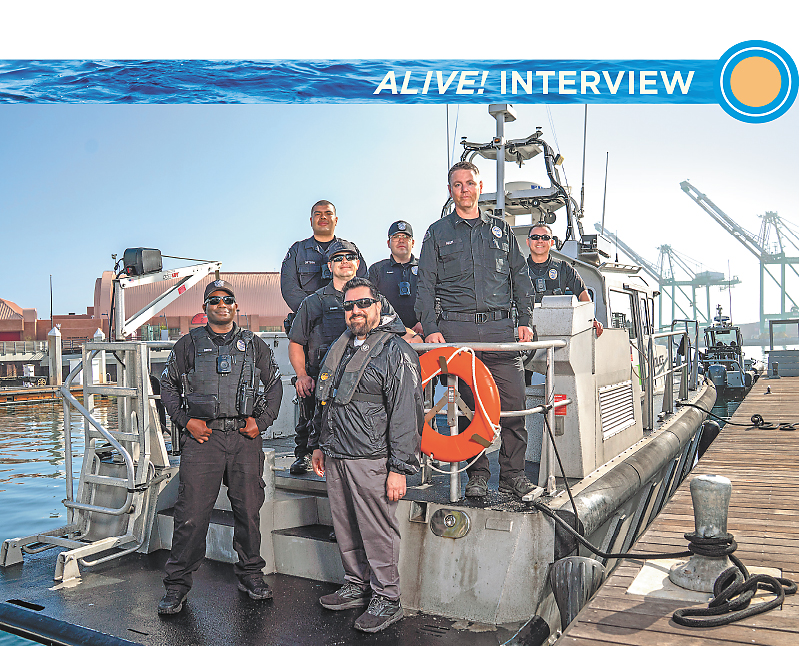

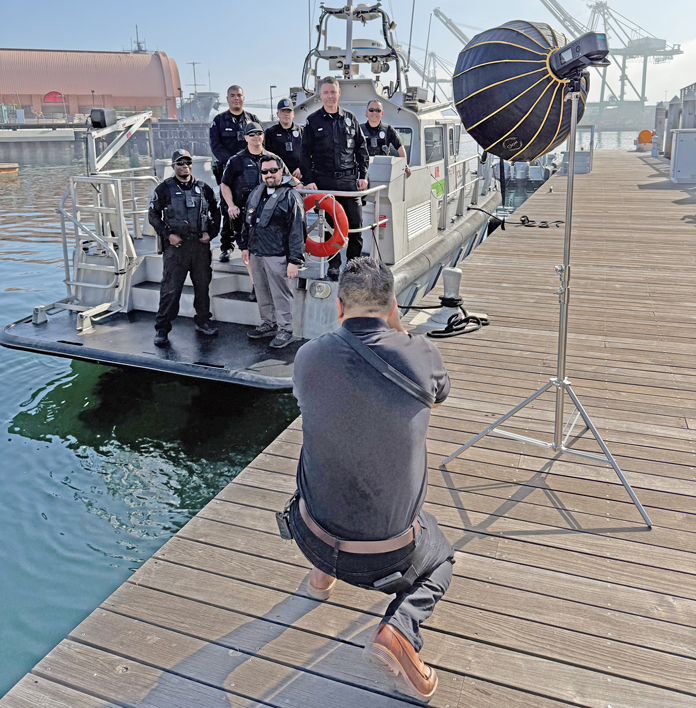 Club COO Summy Lam (front) photographs Club CEO Robert Larios and members of the Port Police Marine Unit aboard Boat 42 in the Port of LA.
Club COO Summy Lam (front) photographs Club CEO Robert Larios and members of the Port Police Marine Unit aboard Boat 42 in the Port of LA.
